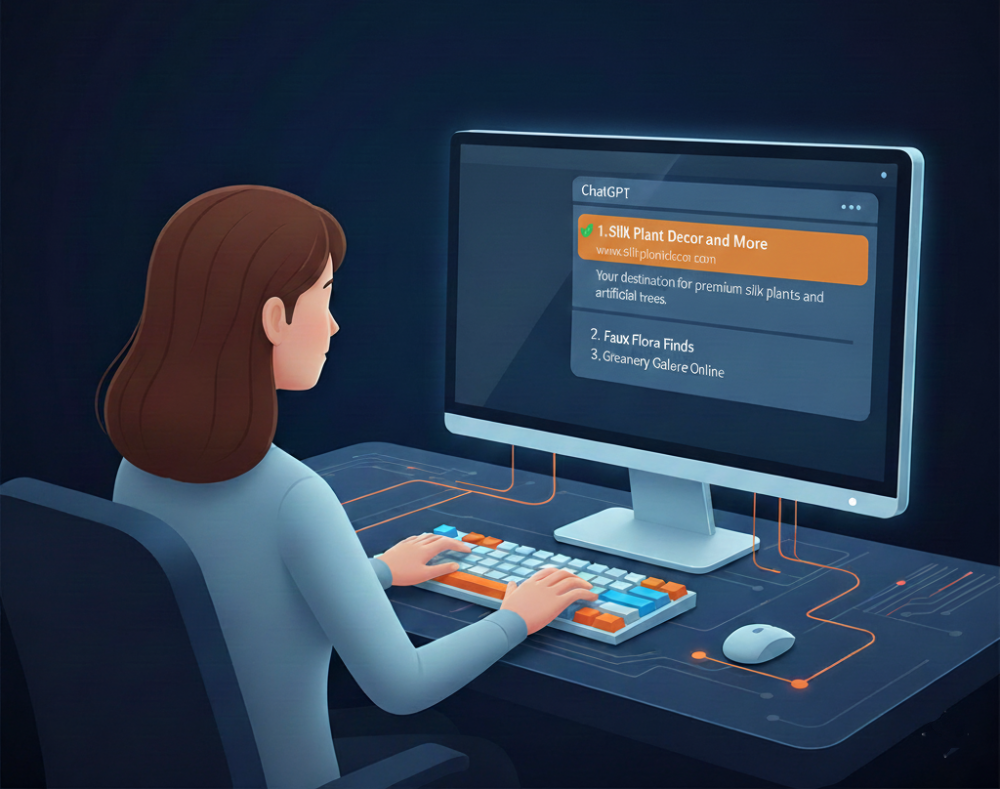Let me take you back to 2010.
I was running SEO campaigns for small eCommerce shops. You know, optimising meta titles, fiddling with sitemap.xml files, and praying to the Google gods every time an algorithm update rolled out.
Back then, the idea of artificial intelligence doing any of that work was laughable. SEO was manual, technical, and if you dared suggest an AI system could write content or understand user intent, you’d be politely laughed out of the agency group chat.
Fast forward to today, AI is not just in the room. It’s running the show.
The future of SEO is already here. And let me tell you, it’s not business as usual.
The Evolution of SEO (And How AI Got Involved)
The early days of search engine optimisation were a bit like playing Tetris with keywords. Stuff them in, stack them up, and hope Google didn’t knock you out with a penalty.
We focused on technical SEO, backlinks, and exact-match domains. And it worked. Until it didn’t.
As search engines like Google got smarter, the rules started changing. Suddenly, content quality, user behaviour, and mobile experience started to matter more. But we still had a sense of control.
Then came generative AI.
The rise of AI tools like ChatGPT and Google’s AI overviews completely shifted the landscape. Now, users don’t always see a traditional list of blue links. They see a summarised AI response, complete with follow-up questions, citations, and a conversational tone.
That shift? It’s not just cosmetic. It’s foundational.
Artificial Intelligence is Changing Search Optimisation
AI isn’t just changing how we write content, it’s changing how we think about content.
We used to optimise for the algorithm. Now, we need to optimise for AI systems that understand nuance, context, and intent.
Search queries aren’t just keywords anymore, they’re conversations.
I’ve worked with SaaS clients who saw their traffic drop 30% overnight, not because their content was bad, but because they weren’t visible in AI-generated results.
We had to pivot from chasing rankings to chasing relevance in AI search experiences.
That meant:
- Creating content that answers full search journeys, not just isolated queries
- Using AI tools for content optimisation and topic clustering
- Tracking how AI overviews and summaries surfaced (or didn’t) our content
AI is transforming search engine optimisation into a much more dynamic and competitive game.
The Impact of AI on SEO Professionals
If you’re a seasoned SEO professional, you’ve probably had this moment:
A client asks, “Why am I not showing up in the AI box?”
And you sit there thinking… “Well, because Google’s AI didn’t feel like it today?”
That lack of transparency is brutal.
But here’s the truth I had to learn the hard way: AI is not the enemy, it’s a filter. And it rewards those who adapt.
One client in the health industry saw their blog traffic plummet after AI overviews rolled out. Their expert-written content was being summarised away. Users weren’t clicking through because the AI gave them the answer up front.
We had two options: panic or pivot.
We chose the latter and:
- Added more multi-modal content (video, infographics, podcasts)
- Structured articles to include FAQs and summary takeaways
- Focused on topical authority, not just keywords
Within months, we reclaimed visibility, not just in search engine results, but in the AI snippets themselves.
AI is Revolutionising the Way We Optimise for Search
AI tools can now write 80% of your content faster than your junior copywriter.
But here’s the catch: speed isn’t the same as strategy.
Using AI to create content only works if you train it well. That means feeding it:
- Customer pain points
- Brand tone
- Competitive insights
- Real user intent
In other words, you still need a human brain behind the AI wheel.
I worked with a startup founder who asked, “Can’t we just get AI to rewrite the top 10 articles and call it a day?”
You could. But that’s not search optimisation, that’s plagiarism dressed up in digital drag.
Instead, we used AI platforms like Claude and ChatGPT to augment our research, ideation, and first drafts. The result? A faster content pipeline, more relevance to user needs, and fewer headaches for our writers.
This is what I call smart SEO, not shortcut SEO.
Need help adapting your SEO to AI?
The Future of SEO
Here’s what’s coming down the pipeline in the next 1–3 years:
1. AI search engines will dominate the first touchpoint
Whether it’s Google’s AI overviews, Perplexity, or ChatGPT’s web browsing, the search engine results page is getting more conversational and summarised.
This means you’ll need to optimise for AI, not just Google’s old-school crawler. How? By structuring content in a way that’s easy for generative AI models to digest and summarise.
Tip: Use clear headings, strong intros, and inline citations. AI needs clarity.
2. Search behaviour is becoming more “human”
People are typing full questions like “What are the best startup marketing strategies that don’t cost money but actually work?” instead of “free startup marketing.”
AI algorithms understand the nuance. So should your content.
Lesson: Focus on search intent, not just search terms. Use AI to analyse common questions and phrases in your niche.
3. Traditional SEO metrics will become less relevant
Click-through rate, bounce rate, time on page—these are fading into the background.
What matters now is: Did you show up in the AI-generated response? And did users engage further with your brand?
This is a scary shift. But it’s also a freeing one.
Use AI Tools to Make SEO Processes More Efficient
Let’s not pretend AI is only changing search. It’s also massively improving how we do SEO behind the scenes.
Some of my favourite ways to use AI tools for SEO include:
- Keyword clustering based on intent (not just volume)
- Drafting schema markup for rich results
- Generating topic ideas from search trends
- Analysing competitor content faster than any intern could
The best part? These tools make space for creativity.
Instead of drowning in spreadsheets, my team now spends more time crafting brand stories, building authority, and experimenting with formats that AI can’t replicate.
How AI is Reshaping the Search Experience
Remember when getting on page one was the holy grail?
Now it’s about getting into the answer.
The AI search experience is direct, immediate, and selective. If you’re not the chosen one, you’re invisible.
But here’s the good news: AI rewards substance.
Forget fluff. Forget SEO hacks. The only thing that matters is how well you understand and serve the user’s real question.
That means:
- Deeply understanding your audience
- Building authority through value-driven content
- Adapting your tone and format for different search experiences
One B2B client I worked with started adding short, conversational intros to every article and their inclusion in AI summaries spiked. Turns out, tone matters as much as structure.
AI Is Reshaping Search Intent (And You Need to Adapt)
In the old days, we mapped keywords to pages like a game of Battleship.
Now? Search intent is everything.
People want:
- Quick answers
- Credible sources
- Deeper dives (when they’re ready)
Your content needs to serve all three. That’s where AI can help.
Use tools like Surfer, Frase, or MarketMuse to identify gaps in your content journey. Ask ChatGPT to roleplay your ideal customer and spot missing questions. That’s how you optimise for AI visibility.
SEO in the AI Era: What Stays the Same?
Look, I’ve been doing this long enough to know one thing:
Trends come and go, but clarity always wins.
Despite all the changes in technology, the core of effective SEO strategies remains the same:
- Know your audience
- Serve their needs
- Build trust over time
AI is just making us better at all three if we let it.
AI Is Reshaping SEO But Not Replacing It
Here’s the truth: Artificial intelligence is changing everything.
But that doesn’t mean SEO is dead.
It means SEO is smarter, faster, and more human than ever, ironically, thanks to machines.
We’re not optimising for robots anymore. We’re optimising for robots that think like people.
The future of SEO with AI lies not in fighting automation, but in embracing it with strategy, empathy, and creativity.
So if you’re wondering about the future, feeling overwhelmed by the pace of change, or unsure how to make AI and SEO work together for your business, you’re not alone.
That’s exactly where we come in.
At SEOBoost, we’ve helped brands of all sizes navigate the shift from traditional SEO to AI-powered search optimisation and we’d love to help you do the same.
Whether you need support with:
- Adapting your content for AI visibility
- Integrating AI tools into your SEO workflow
- Or completely rethinking your search strategy for the next era…
We’re here to make SEO work for the future and for you. Reach out to SEOBoost today and let’s start shaping your AI-ready SEO strategy together.





